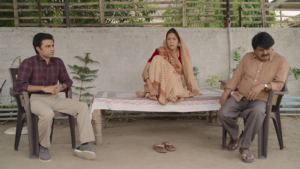In the gripping narrative of this story, Shakti, a 12-year-old boy, mysteriously disappears from the highly regarded RISE boarding school, setting off a chain of events that unravels a web of deceit, exposing buried secrets with deadly consequences. As the truth gradually emerges, it deviates from initial expectations yet remains equally painful and heart-wrenching.
While inspired by true events, the story occurs in the fictional RISE boarding school, nestled amidst hills in Dalton Town. This idyllic yet eerie setting amplifies the fear and haunting thoughts that permeate the mind, successfully captivating and unsettling the audience.

However, beyond its visual representation, the location symbolizes the dark thoughts consuming the people within its walls. The series effectively portrays the expansive and impressive cast, refraining from fully exonerating or condemning any individual for the crime. The young boy’s disappearance, though initially perceived as the primary predicament, unveils a sinister underlying design that surpasses all expectations.
Boarding schools often acquire an eerie reputation, but in this case, it is not supernatural entities haunting the premises but rather the people themselves. Furthermore, the school’s generational legacy attempts to conceal heinous crimes that occur under its roof.
Remarkably, the series deserves acclaim for not solely relying on established veteran actors to carry the show. Instead, it places the young actors within the school at the forefront, leading the narrative with their tragic stories. Varin Roopani’s portrayal of Vikram, particularly in his scenes with Nimrat Kaur, provides one of the most memorable aspects of the series, along with his fractured friendship with Aryan Singh Ahlawat, who portrays TK.

The series emphasizes how the real world frequently deviates from its idealized representation by delving into difficult topics like child abuse, both inside and outside of the school. Paradoxically, despite the picturesque hillsides, the location compels introspection, unveiling a menacing void that instills fear.
Through Shakti’s character, the series explores the profound loneliness that ensues. This exploration delves into philosophical depths while highlighting that such emotions often arise from familial traumas perpetuating across generations. Geetika Vidya Ohlyan’s portrayal of a helpless mother clinging desperately to the hope of finding her son is heartrending, particularly in Episode 3.
Each character grapples with their struggles, and while the series doesn’t delve deeply into each individual’s story, it consistently reminds us that they all harbor hidden sorrows. Loneliness is further emphasized as these characters silently suffer alone, adding to a growing list of problems that will haunt them in the future.

The ultimate revelation may not be as grand as anticipated, yet it remains far from disappointing. Instead, it serves as a reminder that Shakti’s disappearance acts as a catalyst, shedding light on other darker truths and fabrications previously concealed.
In the initial episodes, the series skillfully expands on the mystery, deliberately complicating the timeline with its non-linear storytelling. This technique fuels curiosity, propelling the audience forward, questioning whether the case involves kidnapping, a more sinister force that drove Shakti away, or simply a deliberate act of escape on the boy’s part.
Ultimately, what resonated most with me was a poignant dialogue reflecting the impact of living in a boarding school, describing it as “compulsion at best, and prison at worst.” This sentiment extends beyond the boarding school context, encapsulating life itself and the experience of loneliness.
Occasionally, the series refrains from delving too deeply into the thought-provoking conversations it initiates. At times, the creation of the eerie setting takes precedence, overshadowing. Do give it a watch!!




